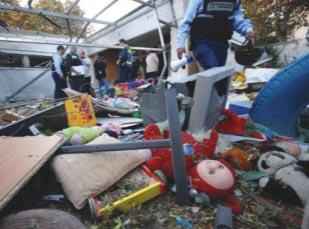 |
| Israeli police officers examine damage at a kindergarten after a rocket fired by Palestinians militants from Gaza hit the southern Israeli city of Ashdod yesterday. Israeli forces pounded Gaza Strip houses, mosques and smuggling tunnels yesterday from the air, land and sea, killing at least seven children as they pressed a bruising offensive against Palestinian militants. (Avi Roccah/Associated Press) |
The picture of a destroyed kindergarten in the Israeli port city of Ashdod that had suffered a direct hit from Gaza led on all Israeli news sites and reminded the people of Israel as to why the Israel Defense Forces (IDF) had invaded the Gaza Strip.
The Ashdod kindergarten was empty at the time because parents have been told to keep their children home from all Israeli educational institutions within 30 miles of Gaza.
By yesterday evening, the IDF had surrounded the city of Gaza from every direction, with ground forces laying to the north, south and east of the city, while Israel Navy vessels remain off the shore to the west of the city.
The IDF disseminated few details about the warfare in Gaza beyond the general location of its troops.
AdSys ad not found for top_stories:instory –>
IDF troops have begun to take up positions in houses on the outskirts of Gaza City, while others are deployed in the area of the northern towns of Beit Hanoun and Beit Lahiya and the rocket launching grounds that lie just outside them.
A general assumption exists that Hamas would like to draw IDF troops into the dense urban areas where it feels it has a better chance of gaining the upper hand.
Israeli military sources report that the IDF operations in Gaza are proceeding as planned and troops are meeting their set objectives.
Hamas likely will surprise the Israeli troops by various means, such as employing commando raids. The Israeli Air Force (IAF) struck some 30 targets last night, including tunnels, homes of Hamas operatives as well as weapons depots. The Israel Navy struck several targets including rocket-launching sites.
On Sunday, Israel initiated a call-up of tens of thousands of reservists.
This call up will allow the army not to be taken by surprise in its northern border or on the Jerusalem front lines.
Kidnapping Attempt
An attempt to kidnap a soldier was prevented on Sunday in the course of combat in Gaza. Golani troops had entered the house of a Hamas official and discovered several tunnels there. Exchanges of fire ensued between one soldier who had been cut off from his unit and the Hamas fighters. They attempted to pull him into one of the tunnels. Helicopters were brought to the area and the soldier was able to get away and return to his comrades.
The Israeli security establishment announced that it would not respond to false rumors spread by Hamas about the “abduction of two Israeli soldiers.”
The First Israeli Fatality
First Sgt. Dvir Emmanuelof, 22, from Givat Zeev, just north of Jerusalem who was killed in the course of gunfire exchange with Arab terrorists, was brought to rest last night in Jerusalem. First Sgt. Emmanuelof was a combat soldier in the Golani Brigade’s engineer company. In the course of the fighting between Saturday and yesterday, 45 Israeli soldiers were injured.
Diplomatic Rumblings
French President Nicolas Sarkozy arrived in Israel on Monday evening to hold talks with the Prime Minister Ehud Olmert and Defense Minister Ehud Barak. They also met with Quartet envoy to the Middle East Tony Blair. The foreign minister met with Russian Deputy Foreign Minister Alexander Sultanov.
Yesterday, she met with the European Union forum, which includes the foreign ministers of the Czech Republic, Sweden and France. Israeli Foreign Minister Tzipi Livni also held phone conversations with other colleagues of hers as well as the foreign ministers of Arab countries. A Hamas delegation is expected to arrive in Cairo today following Egypt’s invitation to come and discuss Israel’s military operation in the Gaza Strip, according to senior Hamas official Ayman Taha.
Unprecedented Turkish Tirade
In an unprecedented tirade, Turkish Prime Minister Erdogan gave a fiery speech following his tour in the Middle East that Israel was conducting inhuman acts in the Gaza Strip, acts that would cause Israel to destroy itself. He declared, “Allah would punish at those who violate the rights of the innocent.”
 

The Back Alley Trap
Senior sources in the Israeli security establishment say they believe the bombardment of Gaza by artillery batteries and fighter jets has helped Israeli ground forces and severely damaged Hamas. Many civilians have been forced to leave their homes and flee into the more distant Gaza city center.
“At first we would phone a house, so that the residents would leave before we bomb, and the occupants would get smart with us,” explained a senior security source. “Now, however, they’ve had second thoughts and leave even before we call. In many places, there are no civilians at all and only the terrorists are left.”
Israeli troops reported that some of these deserted houses had been turned into fortresses that the terrorists used against the IDF.
In one case, troops stormed a Palestinian house where shots had been fired at them, and after the initial “cleansing,” after they had ensured the house was not booby trapped, it was discovered the terrorists had escaped through tunnels dug under the house. 
 

IDF forces are encountering resistance, but Hamas has not fired used guided missiles against them, as did Hezbollah during the July 2006 war in Lebanon, despite intelligence estimates that Hamas has such weaponry. 

Meanwhile, large-scale explosive charges have yet to be discovered during the Gaza invasion. Some attribute this to the preceding bombardment, which detonated some explosive devices. The IDF’s tactics also could be playing a role because it is not moving its armored vehicles along potentially booby-trapped main roads.
“We are not using the existing roads but rather are creating new arteries,” explained a security source. “Also, houses from which terrorists shoot and put troops in
danger, are immediately destroyed by means of artillery or bombardment
from the air. The IDF also believes that the terrorists are trying to
lure the forces deep into the built-up areas from where they will be
able to ambush them.”
Israeli security sources say there are three main goals to the ground operation stage of
Operation Cast Lead:
• Preventing Grad and Qassam rocket
launches;
• Destroying ammunition stores and severely hurting the
enemy;
• and taking captives and
apprehending those involved in terrorism and bring them to interrogation in
Israel.
The al-Arabiya channel even reported last night that IDF troops
had arrested civilians and tried to extract from them information concerning the whereabouts of Hamas military wing operatives.
The Egyptian Factor
Ms. Livni emphasized the problem of smuggling weapons and other items from Egyptian territory into Gaza. Israel faces a delicate problem because it needs to improve the situation without openly accusing Egypt of being unwilling or unable of preventing such smuggling.
The Jewish state also faces a division over what its proper strategy should be because of a difference of opinion between Mr. Barak and Mr. Olmert. The prime minister operates on the basis of an assumption that more time is good for Israel, while Mr. Barak prefers to deal with navigating the warfare. No one on the Israeli side has expressed any urgency for reaching the start of the endgame.
Iranian Warning
Iran has sent Israel an explicit warning passed on by means of a Scandinavian embassy in Tehran.
“If you launch a ground operation in Gaza, we’ll act against you,” the message reads.

Iran views the recent turn of events in the most forward outpost of its Islamic revolution with concern. Hamas, a product of that revolution, has been taking a terrible beating. If that outpost should fall, it is liable to produce a chain reaction, both physically and in terms of morale. 
 

On the other hand, the Israeli intelligence community believes Iran will not act now because it cannot afford to. They likely will not allow Hamas to jeopardize its nuclear program or give Israel further reasons to attack.
However, leader of the Revolutionary Guard in Iran said that there was no need to assist Hamas in its war against Israel in Gaza. In an interview with an Iranian press agency, General Mohammad Ali Jafari said Hamas appears to have the necessary means to fight Israel. The speaker of the Iranian parliament arrived yesterday in Syria.
Will The Israeli Elections Be Canceled?
In five weeks, the elections for the 17th Knesset are scheduled, and increasing voices are requesting their postponement.
Influential Israel Government Minister Rafi Eitan proposed postponing the elections by six weeks, a suggestion opposed by senior figures in Kadima, the Labor Party and the Likud. 
 

“It seems to me that it’s a mistake to continue the election campaign while our soldiers are at the front and our citizens in the shelters,” Minister Eitan said yesterday at the cabinet meeting. “The elections should be postponed by at least six weeks. I believe that this is the will of the entire people, including the soldiers, their parents and
their families. This should be decided upon immediately and the topic should be completely taken off the agenda.”

Figures in the political establishment are opposed to postponing elections, but a consensus exists that they cannot be held under the threat from long-range shelling.
“If the residents are forced to continue sitting in shelters, it will be a significant disruption to the democratic process,” a senior source in one of the parties said. “As of now, we should wait and see whether the fire stops, but if this doesn’t happen, there will be no choice but to hold a serious discussion and set a new election date.”
David Bedein can be reached at dbedein@israelbehindthenews.com







